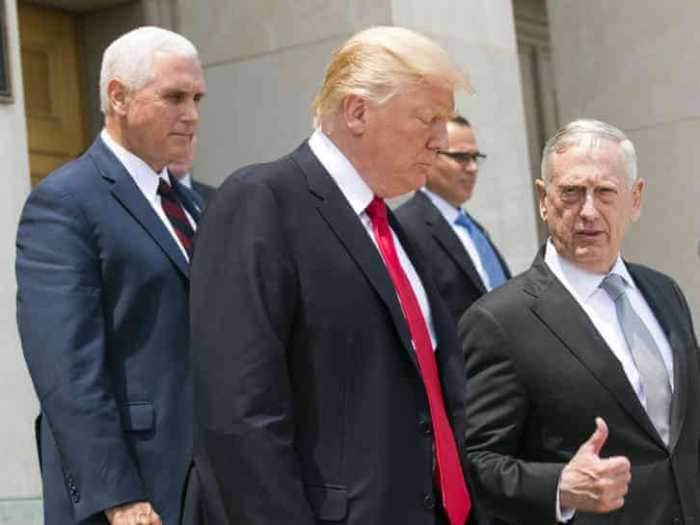President Donald Trump and Defense Secretary James Mattis. | DEFENSE.GOV
US Senior District Judge Marsha J. Pechman in Seattle, on June 15, rejected another attempt by the Trump administration to get her to lift her preliminary injunction against its proposed ban on military service by transgender individuals while officials appeal to the Ninth Circuit Court of Appeals. Pechman’s opinion emphatically rejects arguments the Justice Department has made all along.
Donald Trump initiated his new policy with a series of tweets last July purporting to reverse President Barack Obama’s opening up of transgender service in July 2016. The policy was spelled out in a formal memorandum a month later, directing Defense Secretary James Mattis to plan for implementation by this March.
Four lawsuits were filed by different groups of plaintiffs in Washington, DC, Baltimore, Seattle, and Riverside, California challenging the policy’s constitutionality. All four federal district judges found that the plaintiffs were likely to win on the merits and issued preliminary injunctions against implementation while the litigation proceeded. None was willing to stay their injunction pending appeal, and the DC and Fourth Circuit Courts of Appeals also rejected motions to stay. At that point, the Justice Department temporarily desisted from further appeals.
Seattle federal court judge once again refuses to lift her injunction
When Mattis submitted his implementation plan in February it differed in some particulars from Trump’s memo from last August, and so the president “withdrew” his order and authorized the Pentagon to move forward with its plan. The Justice Department then argued to Pechman that her preliminary injunction should be lifted, since it was based on the Trump memorandum and not the Mattis plan.
Pechman, however, concluded, in line with the plaintiffs’ arguments, that the new policy was just a slightly modified version of the Trump proposal, presenting the same constitutional flaws, so she refused to vacate her injunction.
On April 30, the Justice Department filed a notice of appeal to the Ninth Circuit and filed a motion with Pechman seeking an expedited ruling on the plaintiffs’ motion for summary judgment so that it could be appealed. Pechman, noting that discovery was needed in the case to determine any disputed facts that require resolution, declined the government’s motion. Discovery, however, has been delayed by the Justice Department’s claim of executive privilege in the matter.
The Ninth Circuit, meanwhile, has not responded to the Justice Department’s request for a stay of Pechman’s order pending appeal.
Pechman reiterated that she is not convinced by the argument that the Mattis plan represents a “new and different” policy, and she was also not persuaded by the Justice Department’s assertion that she or the Ninth Circuit “are highly likely to conclude that significant deference is appropriate” to the Executive Branch’s military decision-making. She pointed out that there are three other nationwide preliminary injunctions also in place.
The Justice Department also argued that failure to let the government implement the ban “will irreparably harm the government (and the public) by compelling the military to adhere to a policy it has concluded poses substantial risks.” Here Pechman pointed to recent congressional testimony by the Army chief of staff, General Mark Milley, and the chief of naval operations, Admiral John Richardson, that there were no problems with transgender people serving, as thousands are now doing. Milley stated he “monitors very closely” the situation and had received “precisely zero”’ reports of problems. Similarly, Richardson said that in his experience “it’s steady as she goes.”
Pechman found that staying her injunction would likely cause irreparable injury to the plaintiffs.
She also held that “maintaining the injunction pending appeal advances the public’s interest in a strong national defense, as it allows skilled and qualified service members to continue to serve their country.”
The plaintiffs in the Seattle case are represented by attorneys affiliated with Lambda Legal, Outserve-SLDN, and Seattle local counsel Newman & Du Wors LLP. The State of Washington, co-plaintiff in the case, is represented by attorneys from Kirkland & Ellis in Chicago and the Washington Attorney General’s Office. Fifteen states and the District of Columbia have filed amicus briefs on behalf of the plaintiffs.




































